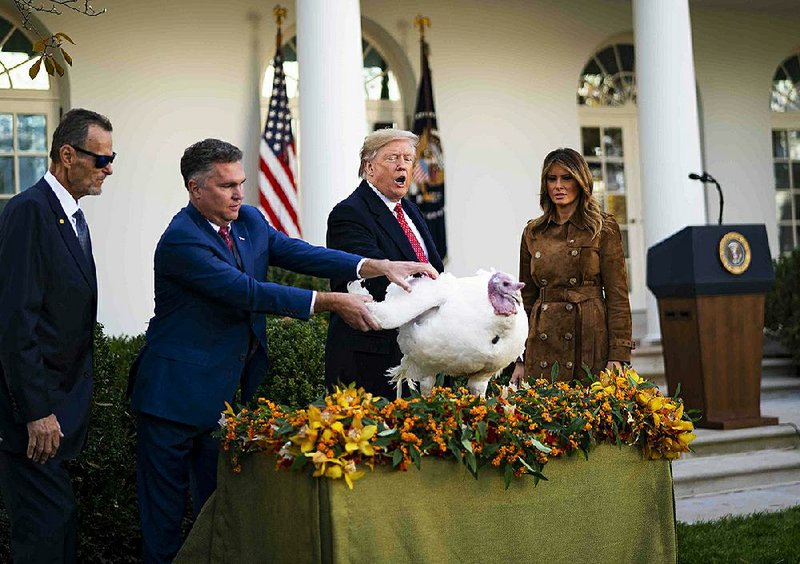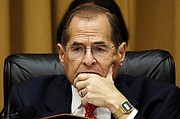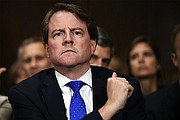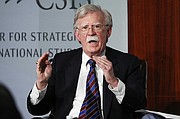WASHINGTON -- House Democrats on Tuesday took steps forward in their impeachment inquiry of President Donald Trump, with the judiciary panel scheduling its first hearing and the budget panel releasing a report alleging the White House broke the law by withholding money meant for Ukraine.
The House Judiciary Committee hearing on Dec. 4 is a crucial step in the impeachment process, as that panel has the power to draft the impeachment articles against Trump.
The judiciary panel scheduled the hearing as the House Intelligence Committee released transcripts from its private depositions, including from a White House budget official who detailed concerns among colleagues as Trump ordered them, through intermediaries, to put a hold on military aid to Ukraine. The official also testified that two budget officials had resigned after voicing concerns over the Ukraine dealings.
New details also emerged Tuesday about when Trump learned of the whistleblower complaint over his July 25 phone call with the Ukrainian president in which Trump asked him to investigate former Vice President Joe Biden and his son, Hunter. Two people familiar with the matter said Trump had already been briefed on the whistleblower's complaint when he unfroze military aid for the country in September.
[Video not showing up above? Click here to watch » https://www.youtube.com/watch?v=EZcE_1f9X54]
Lawyers from the White House counsel's office told Trump in late August about the complaint, explaining that they were trying to determine whether they were legally required to give it to Congress, the people said.
Whistleblower complaints are typically to be submitted to lawmakers who have oversight of the intelligence agencies. In late August, the inspector general for the intelligence community, Michael Atkinson, concluded that the administration needed to send it to Congress.
But the White House counsel, Pat Cipollone, and his deputy John Eisenberg disagreed. They decided that the administration could withhold from Congress the whistleblower's accusations because they were protected by executive privilege. The lawyers told Trump that they planned to ask the Justice Department's Office of Legal Counsel to determine whether they had to disclose the complaint to lawmakers.
A week later, the Office of Legal Counsel concluded that the administration did not have to hand over the complaint.
[Gallery not loading above? Click here for photos » arkansasonline.com/1127turkey/]
It is unclear how much detail the lawyers provided Trump about the complaint. The New York Times reported in September that White House advisers -- namely, Cipollone and Eisenberg -- knew about the whistleblower complaint in August. But the specifics of when and how Trump learned of it have not previously been reported.
In announcing the Dec. 4 hearing, House Judiciary Committee Chairman Jerrold Nadler, D-N.Y., sent a 13-page letter to Trump and asked whether he or his lawyer planned to attend and question witnesses.
"We expect to discuss the constitutional framework through which the House may analyze the evidence gathered in the present inquiry," Nadler wrote. "We will also discuss whether your alleged actions warrant the House's exercising its authority to adopt articles of impeachment."
Nadler asked Trump to notify the committee by Sunday if he plans to participate in any way. Last week, Trump said he would seriously consider responding to written questions as part of the inquiry, but he hasn't mentioned the idea since.
Trump on Tuesday gave mixed signals about whether the White House might participate with the process. In a string of Twitter posts, Trump wrote "I would actually like people to testify" but suggested he wasn't allowing his top current and former aides to testify because it would set a dangerous precedent for future presidents.
"It is a Democrat Scam that is going nowhere but, future Presidents should in no way be compromised," he wrote. "What has happened to me should never happen to another President!"
UKRAINE AID TIMELINE
Democrats have tried to establish a timeline of events that show the Ukraine aid money was withheld around the same time Trump was ratcheting up pressure on Ukrainian President Volodymyr Zelenskiy to investigate the Bidens.
In a transcript of closed testimony released Tuesday by the Intelligence Committee, Office of Management and Budget official Mark Sandy told lawmakers that his office was notified as early as July 12 by the White House chief of staff's office that Trump was withholding the military aid. That was two weeks before Trump asked Zelenskiy in a phone call to investigate Democrats.
Sandy testified that Trump himself requested additional information about the aid on July 19 after seeing an unidentified "media report." The office then started the official process of withholding the money on July 25, the day of the call between Trump and Zelenskiy, Sandy said.
He said that he raised concerns about the legality of the holdup, but wasn't given a reason until September, when he was told that Trump was concerned "about other countries not contributing more to Ukraine."
Sandy also said that two budget office officials resigned while voicing concerns over the holdup on Ukraine aid.
He did not name the employees in question. He said one worked in the legal division and described that person as having a "dissenting opinion" about how the security assistance to Ukraine could be held up in light of the Impoundment Control Act, which limits the ability of the executive branch to change spending decisions already made by Congress.
The other person, who resigned in September, "expressed some frustrations about not understanding the reason for the hold," Sandy said.
Also Tuesday, the House Budget Committee issued a report that it said was based on documents it obtained from the White House's Office of Management and Budget.
The House Budget Committee's report alleged that the budget office engaged in a "pattern of abuse" of its authority and the law in holding up the security assistance to Ukraine.
In findings based on the documents turned over by the budget office, the Democrat-led Budget Committee cites unusual steps the agency took over the summer as it moved to hold up nearly $400 million in State Department and Pentagon funds for Ukraine that had already been approved by Congress.
The committee said that the budget office put a political appointee in charge of signing off on spending, a step that was typically handled by career officials.
It also said the budget office's actions limited agencies' ability to spend congressionally approved funds by the end of the fiscal year.
The latter move would be a violation of the Impoundment Control Act, the Budget Committee said.
In addition, the new report confirms a timeline of events related to the Ukraine aid decisions. It says, for example, that on July 18, the budget office notified an interagency working group about a plan to withhold Ukraine funds.
One week later, on the morning of July 25, Trump and Zelenskiy spoke by phone, and Trump mentioned the possibility of Zelenskiy working with the U.S. government on an investigation into Biden and his son, according to a transcript released by the White House. Later that day, at 6:44 p.m., according to the Budget Committee summary, an Office of Management and Budget career official signed a document formally withholding $250 million in Pentagon funds for Ukraine.
After this point, political appointees took over the process of approving the funds. The frozen aid was not released until Sept. 12, after House lawmakers were notified of a whistleblower report regarding the Trump-Zelenskiy call.
The committee's report also said that the budget office released only a portion of the documents it sought in a detailed request to the agency two months ago from House Budget Chairman John Yarmuth, D-Ky., and House Appropriations Chairwoman Nita Lowey, D-N.Y.
"After careful review of the materials provided to the committees, the Chairs have become more concerned that the apportionment process has been abused to undermine Congress's constitutional power of the purse," the committee report says. "The timeline of actions taken by [the Office of Management and Budget] (as seen in the provided apportionments, which are legally binding documents) suggest a pattern of abuse of the apportionment process, OMB's authority, and current law."
The "apportionments" are the documents that the budget office must sign off on in order for the U.S. Treasury to release or hold up funds.
Separately, John Bolton, the former national security adviser who resisted efforts to pressure Ukraine for help against U.S. domestic political rivals, dashed any expectation Tuesday that he would testify soon in the impeachment investigation in response to a court ruling involving a onetime colleague.
Charles Cooper, a lawyer who represents Bolton, said that a court decision Monday ordering another former White House official to appear before Congress under subpoena did not apply to Bolton because of the nature of his job. Cooper said Bolton would therefore wait for another judge to rule in a separate case that could take weeks more to litigate.
The statement came a day after a federal district judge rejected the assertion that Trump could block aides from responding to congressional subpoenas based on a sweeping claim of presidential immunity. The ruling ordered Donald McGahn, a former White House counsel for Trump, to comply with a House subpoena. McGahn's lawyer filed a notice Tuesday that he would appeal and asked that the order be suspended in the meantime.
Information for this article was contributed by Erica Werner and Felicia Sonmez of The Washington Post; by Mary Clare Jalonick, Lisa Mascaro, Andrew Taylor, Alan Fram, Eric Tucker and Zeke Miller of The Associated Press; and by Peter Baker, Michael S. Schmidt, Julian E. Barnes and Maggie Haberman of The New York Times.
A Section on 11/27/2019



